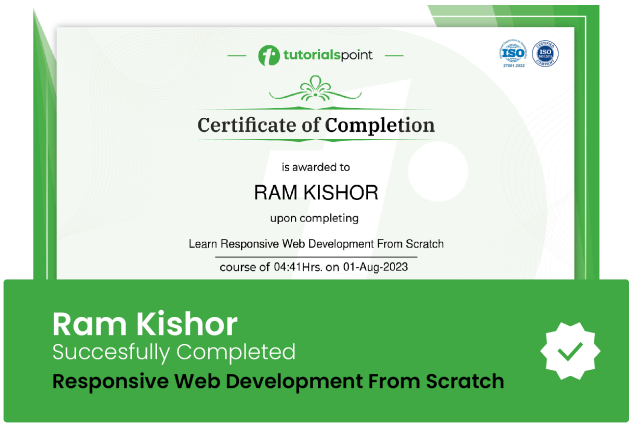Astronomy and Astrophysics Bootcamp By Spotle.ai
This course is an ideal starting point for astrophysics and astronomy enthusiasts

Lectures -14
Duration -1.5 hours

30-days Money-Back Guarantee
Get your team access to 10000+ top Tutorials Point courses anytime, anywhere.
Course Description
Whether you want to build a career in astrophysics or space or are just exploring the areas out of interest, this Spotle.ai compact course will get you started in the fascinating world of astrophysics and astronomy.
The question arises – What is the difference between Astronomy, Astrophysics and Cosmology? So, the differences are very simple. Astronomy actually measures the positions, luminosities, motions and other characteristics of any celestial object, whereas Astrophysics creates the physical theories of small to medium sized structures in the universe, remember, small to medium sized structures in the universe. Whereas, Cosmology does this for large structures, i.e., the entire universe as a whole – all, like galaxies or like other larger structures in the universe.
In our chapter 1, we will start with the basic concept of Astronomy & Astrophysics. So, first let us know what is Astrophysics. So, Astrophysics is a branch of space science that applies the laws of Physics and Chemistry to explain the birth, life and death of stars, planets, galaxies, nebulae, and other objects in the universe as well. It has two sibling sciences – Astrophysics and Cosmology. So, now let’s move to them also.
In chapter 2, we will learn about the time.
At first the question is, what is Time? So, there is a very easy and simple answer that time is what a clock measure. This is what we all know. Now, this time is actually measured based on the position of the sun. Like you all know that when the Sun is exactly at our zenith, now we have discussed about zenith in our last lesson, that approximate, that particular time is called 12 noon. So, the position of the sun actually decides the time. So, the time at any point on earth can be measured by knowing the longitude of that point, which means time changes with longitude and that is very very very important. This concept is very much important for time. So, with the change of longitude, time changes and for the change in each degree of longitude, the change in time is 4 minutes. So, based on these conceptions, we will start, we will go into some other aspects of time.
Goals
What will you learn in this course:
Overview of astronomy and astrophysics
The concept of time
Cosmic or celestial materials
The Sun
Fundamental of forces and gravitational force
Escape velocity and black holes
Different types of telescopes
BONUS - Application of artificial intelligence in space exploration
BONUS - Career options in astronomy and astrophysics
BONUS - 24 quiz questions with answers and explanations on Solar System and the Universe
Prerequisites
What are the prerequisites for this course?
- In this course we will start from the scratch.

Curriculum
Check out the detailed breakdown of what’s inside the course
Overview Of Astronomy And Astrophysics
1 Lectures
-
Overview Of Astronomy And Astrophysics 17:25 17:25
The Concept Of Time
1 Lectures

Cosmic Or Celestial Materials
1 Lectures

The Sun
1 Lectures

Modern Astronomy
3 Lectures

Applications Artificial Intelligence In Space Exploration
2 Lectures

Careers In Astronomy And Astrophysics
1 Lectures

BONUS - Quiz
4 Lectures

Instructor Details

Spotle Learn
eCourse Certificate
Use your certificate to make a career change or to advance in your current career.

Our students work
with the Best


































Related Video Courses
View MoreAnnual Membership
Become a valued member of Tutorials Point and enjoy unlimited access to our vast library of top-rated Video Courses
Subscribe now
Online Certifications
Master prominent technologies at full length and become a valued certified professional.
Explore Now


 Updated on Apr, 2024
Updated on Apr, 2024
 Language - English
Language - English